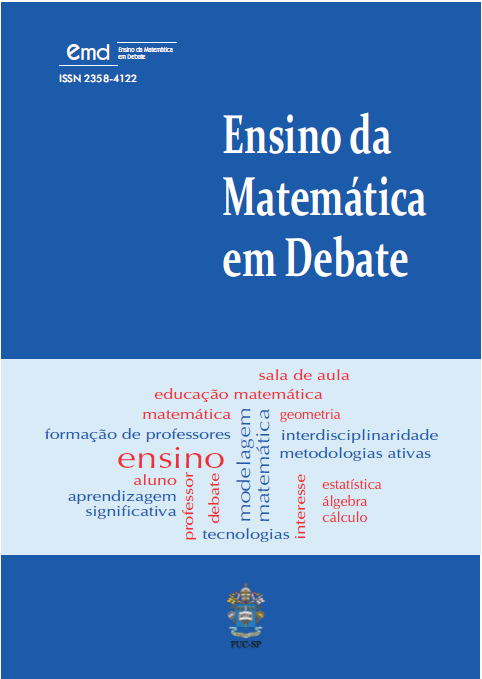Problematizando saberes de conteúdo matemático do ensino numa perspectiva política
Palavras-chave:
Matemática problematizada, Desenvolvimento profissional docente, Conteúdo matemático no contexto políticoResumo
Considerando que o saber de conteúdo do professor que ensina matemática se estabelece politicamente a partir de sua episteme e numa não neutralidade na atividade de ensino, analisamos discussões de conteúdo matemático, observando professores discutindo suas práticas. Para tanto, realizamos uma apropriação sobre a ideia de “matemática problematizada”, tendo como centralidade a discussão epistêmica sobre o próprio conteúdo matemático per se, o conteúdo matemático como finalidade de ensino e seus efeitos. Apontamos caminhos sobre a possibilidade de discutir politicamente o ensino de matemática a partir do tensionamento sobre a naturalização de ideias matemáticas prontas e pré-definidas, na consideração de seus processos de produção, inferindo sobre possíveis efeitos sociais. A partir dessa discussão teórica, analisamos dados produzidos pela imersão do primeiro autor desse artigo no ambiente escolar de professoras que ensinam matemática no ensino fundamental I. Nossas análises indicam que processos de “desnaturalização” de abordagens, com discussões perpassando a natureza dos conteúdos matemáticos a serem ensinados e problematizando os contextos sociais dos sujeitos, podem se revelar como potências no desenvolvimento profissional docente, porque se articulam com aspectos que indicam: transformar a própria prática docente; reafirmar que para ensinar matemática há saberes específicos; o respeito às questões e produções locais; tensionamentos de concepções sobre modus de produção matemática; e possibilitar a reflexão sobre a própria maneira de viver no mundo.
Referências
BALL, D. L.; THAMES, M. H.; PHELPS, G. Content knowledge for teaching: What makes it special? Journal of teacher education, 2008, 59(5), p.389-407.
COCHRAN-SMITH, M.; LYTLE, S. L. Relationships of knowledge and practice: teacher learning in communities. Review of Research in Education, 1999, 24, p.249-305.
COCHRAN-SMITH, M.; LYTLE, S. L. Inquiry as stance: Practitioner research for the next generation. Capítulo 5. New York: Teachers College Press. Traduzido por: Maria Amélia A. Nader; Maristela M. Kondo Claus, 2009.
DAVIS, B.; SIMMT, E. Mathematics-for-teaching: An ongoing investigation of the mathematics that teachers (need to) know. Educational Studies in Mathematics. Springer. Vol. 61, n. 3, 2006, p. 293-319.
DAVIS, B.; RENERT, M. Profound understanding of emergent mathematics: broadening the construct of teachers’ disciplinary knowledge. Educational Studies in Mathematics, 29 (3), 2012, p. 37-43.
FOOTE WHYTE, W. Sociedade de esquina: a estrutura social de uma área urbana pobre e degradada. Tradução de Maria Lucia de Oliveira. Rio de Janeiro, Jorge Zahar, 2005, 390p.
FONSECA, C. Quando cada caso NÃO é um caso. Pesquisa etnográfica e educação. Universidade Federal do Rio Grande do Sul. Trabalho apresentado na XXI Reunião Anual da ANPEd, Caxambu, setembro de 1998. Revista Brasileira de Educação, jan./abr., 1999, nº 10.
FREIRE, P. Conscientização: teoria e prática da libertação: uma introdução ao pensamento de Paulo Freire. Cortez & Moraes: São Paulo, 1979, 53p.
FREIRE, P. Educação: o sonho possível. In. BRANDÃO, C. R. (org.) O educador: vida e morte. Rio de Janeiro: Graal, p. 89-101, 1982.
FREIRE, P. Pedagogia do oprimido. 17ª. ed. São Paulo: Paz e Terra, 1987.
GIRALDO, V.; ROQUE, T. História e Tecnologia na construção de um ambiente problemático para o ensino de matemática. In: ROQUE, T.M; GIRALDO, V.A. (orgs.) O saber do professor de Matemática: Ultrapassando a Dicotomia entre Didática e Conteúdo. Rio de Janeiro: Editora Ciência Moderna Ltda, 2014, pp.08-27.
GIRALDO, V.; RIPOLL, C.; RANGEL, L. Livro do Professor de Matemática da Educação Básica – Volume 1 – Números naturais. Rio de Janeiro: SBM, 2016.
GIRALDO, V. Formação de professores de matemática: para uma abordagem problematizada. Ciencia e Cultura. vol.70 no.1 São Paulo Jan./Mar. 2018 p. 37-42.
GIRALDO, V. Que matemática para a formação de professores? Por uma matemática problematizada. In: XIII Encontro Nacional de Educação Matemática, 2019, Cuiabá-MT.
GIRALDO. V.; MATOS. D.; QUINTANEIRO. W. Entre epistemologias hegemônicas e sabedorias outras: a matemática na encruzilhada. Revista Latinoamericana de Etnomatemática, 2020. 13(1), 49-66. DOI: 10.22267/relatem.20131.40
GIRALDO, V.; ROQUE, T. Por uma Matemática Problematizada: as Ordens de (Re)Invenção. Perspectivas da Educação Matemática: INMA/UFMS – v. 14, n. 35 – Ano 2021.
MALINOWSKI, B. Objeto, método e alcance desta pesquisa. In: GUIMARÃES, A. Z. (Org.). Desvendando máscaras sociais. São Paulo: Francisco Alves, 1980.
MARTINEAU, S. Un champ particulier de la sociologie: les professions. In: TARDIF, M.; GAUTHIER, C. (Éd.). Pour ou contre un ordre professionnel des enseignantes et des enseignants au Québec. Québec: Université Laval, 1999.
NODDINGS, N. Professionalization and mathematics teaching. In: Grouws, D. (Ed). Handbook of research on mathematics teaching and learning, p. 197-208. New York: MacMillan, 1992.
NÓVOA, A. Para uma formação de professores construída dentro da profissão. Professores: imagens do futuro presente. Lisboa: Educa. p.25-46. 2009.
POWELL, A. B.; FRANCISCO, J.; MAHER, C. Uma abordagem à Análise de Dados de Vídeo para investigar o desenvolvimento de ideias e raciocínios matemáticos de estudantes. Tradução de Antônio Olímpio Junior. Bolema – Boletim de Educação Matemática. Rio Claro, n. 21, 2004.
POWELL, A. B.; QUINTANEIRO, W. O Vídeo na Pesquisa Qualitativa em Educação Matemática: Investigando pensamentos de alunos. In POWELL, A. (Org.). Métodos de pesquisa em educação matemática usando escrita, vídeo e internet. 1ed. São Paulo: Mercado de Letras, 2015, v. 1, p. 15-60.
PROBLEMA. In: DICIO, Dicionário Online de Português. Porto: 7Graus, 2021. Disponível em <https://www.dicio.com.br/problema/>. Acesso em: 10/03/2021.
SHULMAN, L. (1986). Those who understand: Knowledge growth in teaching. Educational Researcher, Vol.15, pp.4-14.
SHULMAN, L. (1987) Knowledge and teaching: foundations of the new reform. Havard Educational Review, 1997, v. 57, pp. 1–22.
TARDIF, M.; LESSARD, C.; LAHAYE, L. Os professores face ao saber: esboço de uma problemática do saber docente. Teoria e Educação, v. 4, p. 215-233, 1991.
TARDIF, M. A profissionalização do ensino passados trinta anos: dois passos para a frente e três para trás. Educ Soc: Campinas, v.34, n. 123, p.551-571, abr-jun 2013.
VELHO, G. Individualismo e Cultura. Rio de Janeiro: Zahar, 2008, p.122-134
Downloads
Publicado
Como Citar
Edição
Seção
Licença
Copyright (c) 2023 Ensino da Matemática em Debate

Este trabalho está licenciado sob uma licença Creative Commons Attribution-NonCommercial 4.0 International License.

Este obra está licenciado com uma Licença Creative Commons Atribuição 4.0 Internacional.





